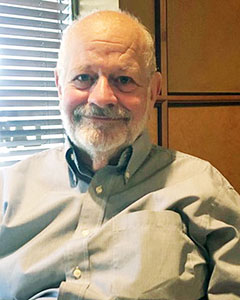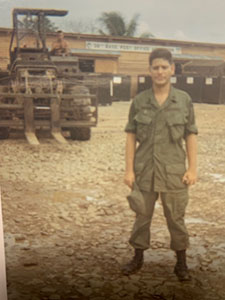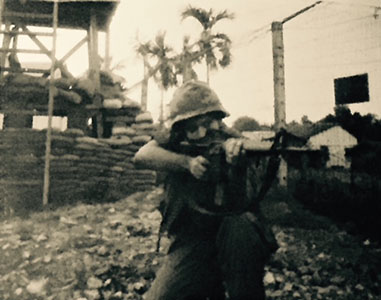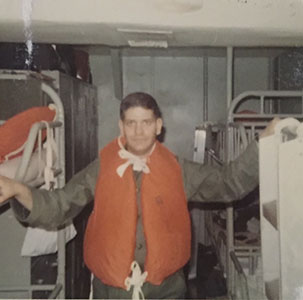Army Vietnam War Naperville, IL Flight date: 06/14/23
By Charlie Souhrada, Honor Flight Chicago Veteran Interview Volunteer
If you admire people with a strong work ethic, you’ll want to help celebrate Donald “Don” Strauss when he joins Honor Flight Chicago’s 108th flight, June 14.
A first generation American born in July 1942, in New York City, Don inherited his strong work ethic from his parents, Irmgard and Herman, who emigrated from Germany to the U.S. in the early 1930’s. Don grew up in Englewood and Teaneck, New Jersey, with younger twin sisters. “In those days, kids were outside from sunrise to sunset. We played games and ran free all day long until our parents called us in for supper.”
At the age of 11, Don got his first job assembling sections of the Sunday New York Times for a local drug store. From there, he took on a series of part time jobs stocking shelves at supermarkets and department stores and working the swing shift in a corrugated cardboard factory.
After graduating from Teaneck High School in 1960, Don transitioned to New York University, where he was an economics and history major while continuing to work his way through college. At NYU, Don joined the Army ROTC program to help reduce his tuition. He took basic training at Fort Indian Town Gap, Pennsylvania, between his college junior and senior years. “My platoon went through Airborne and Ranger Training, and it was rough,” he says. “It seemed like we never slept.”
As an undergraduate, Don won a fellowship to study political science at NYU graduate school. “I then really wanted to go to law school,” he explains, “but the Pentagon would not allow a three-year deferment because the Vietnam War was brewing. Since that timing didn’t work for my ROTC military service commitment, I petitioned for a one-year deferment, and used the time to enter the University of Illinois’ School of Labor and Industrial Relations Program as a graduate student.” Fortunately for Don, the U of I awarded him an assistantship, which provided free tuition, room, and board. Also fortunately, Don met his future wife, Janet, at U of I. “One night at the dorms,” he remembers, “one of my friends suggested we meet the new crop of girls who just started or transferred into the school at a sorority house. Simply put, that’s how we met!”
After earning his master’s degree in labor relations in early 1967, Don entered the Army assigned to the Adjutant General’s Corps, which provides human resources services and personnel support. He completed officer training at Fort Benjamin Harrison in Indianapolis, and was then sent to Fort Bliss, in El Paso, Texas. There, he ran an Army reception station, the first stop for new recruits, processing approximately 4,800 new entrants each month. “It was an enormous facility, about the size of an airplane hangar,” he says. “We simultaneously tested hundreds of soldiers for their MOS (Military Occupational Specialties) and sent the test results to the Pentagon where their future duty assignments were determined (post basic training).”
Later in 1967, in recognition of his work at Fort Bliss, Don received the Army Commendation Medal and orders to report to Fort Riley, Kansas, to assemble a fighting force to go to Vietnam. “In a couple of months, we put together a new fighting unit destined for Vietnam. “We all flew to San Francisco Bay, got on a ship and sailed 28 days to Vietnam,” he says. “As soon as we got there, we were told to climb over the side of the ship and literally waded into Vietnam.”








Don’s duty station was Camp Red Ball, an Army cargo base about the size of a Chicago city block, located some 10 kilometers outside Saigon and Tan Son Nhut Air Base, situated in the middle of rice fields. “Camp Red Ball was an unusual place,” he says. “It included three units: there was the Parcel Post Unit that I helped manage, second was the Red Ball Express, (tanker trucks and their drivers); and a third unit called the Personal Effects Depot (PED), which processed the personal items of dead soldiers for shipment back to the States.”
Leading a unit of 80 soldiers, his job involved unloading Conex boxes from Sealand cargo ships for further processing. A separate unit handled letter mail, while Don’s unit had responsibility for sorting and delivering parcel mail throughout the southern part of Vietnam. More than simple parcels, the contents in these boxes represented love and support from parents who sent their sons everything from salamis, socks, and candy. You name it, people sent everything a soldier might need or want in the field. In his book, “My Vietnam Journey: Told in 50 Short Stories,” Don writes: “I cannot describe how important these packages are welcomed and prized. They often are valued more than money. In fact, they are sometimes exchanged or bartered for other valued items.”
In January 1968, Don’s duty in Vietnam was complete and he returned to the U.S. just three weeks before the Tet Offensive. “We could feel the Viet Cong building up and knew things were going downhill fast,” he says. “We were in a billet with our duffle bags at Bien Hoa Airfield, when an Eastern Airlines flight taxied in. The Viet Cong began shelling the airbase, and we were told to run for the plane so it could quickly take off. It was tense, as I shipped out at just the right time.” Within three weeks, his unit was completely decimated by the Viet Cong during the Tet Offensive, suffering 70 percent casualties.
After arriving back in the States, Don received his Honorable Discharge at Fort Dix, New Jersey, 90 minutes away from where his life began in New York City. He then began his civilian career with Exxon, working in their Human Resources Department, but Uncle Sam wasn’t done with him yet. According to his book, a letter arrived indicating that he was assigned to an Army Reserve unit that met in an armory in Newark, New Jersey’s Central Ward. “This was right after Martin Luther King was killed in Memphis and half of Newark was burned in the rioting,” he remembers. “We drove through areas where buildings were burnt out shells.”
Seven months later, in August 1968, Don was promoted to Captain. While serving in the Army Reserves, he continued to build his career and, more importantly, a life with Jan. In 1970, he received papers updating his Honorable Discharge. After 11 years, and receiving the Army Commendation Medal, Letter of Commendation for Superior Performance, a second Army Commendation Medal (1st Oak Leaf Cluster) for activities in Vietnam, plus Vietnam Service, and National Service Medals, Don’s military service was officially over.
Turning full attention to his wife, family and professional life, Don built a career as a human resources executive with several Fortune 100 companies and taught graduate school programs in organizational behavior on the side for 25 years. In 2006, he retired from Matushita/Panasonic, and opened a non-profit center in Chicago to help people transition to retirement. Three years later, he wrote a book on the subject “Customize … don’t minimize … Your Retirement: 7 Paths to Explore Possibilities, Choices, and Your Future Happiness.” Eight years later, he published his second book on his Vietnam journey, mentioned earlier.
Somehow, among all those activities, Don, and Jan, who live in Naperville, raised their three children: Lynda, Phil, and Elizabeth. Now fully retired, and married to Jan for 57 years, Don keeps active consulting, serving on a non-profit board, volunteering, traveling, walking 10,000+ steps every day and enjoying his seven grandchildren. “I’ve always been described as a hard worker, and it has paid off.” he says. “I’ve had a happy life, there’s no doubt about that!”
Thank you, Don, Honor Flight Chicago appreciates all you and your brothers and sisters in arms have done for our country!


